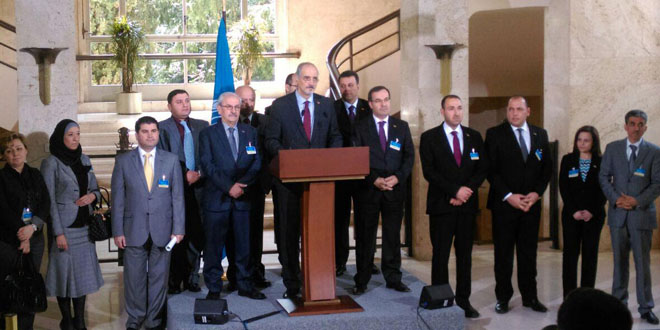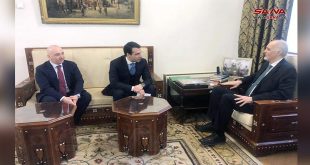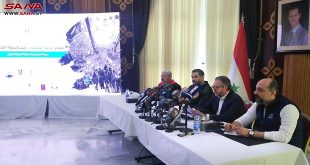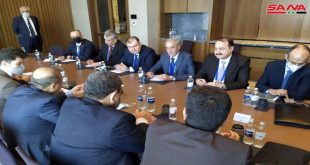Geneva, SANA – The delegation of the Syrian Arab Republic to the intra-Syria dialogue in Geneva has held a session of talks on Wednesday with Ramzi Ezzedine Ramzi, Deputy of the UN Envoy for Syria Staffan de Mistura, at the UN headquarters.
At a press conference after the session, head of the Syrian Arab Republic delegation Bashar al-Jaafari said that they held an expanded session in which they discussed a number issues, adding “we focused on the amendments we made to the Special Envoy’s paper, particularly the ones pertaining to forming a national unity government, and the need to pressure neighboring countries to implement Security Council resolutions on combating terrorism, particularly resolution no. 2253.”
“We urged the Deputy Special Envoy to move immediately on the level of the UN Secretariat-General and Security Council to hold Prime Minister of the Israeli occupation government Benjamin Netanyahu accountable for violating the Security Council resolutions regarding the occupied Syrian Golan, and take the necessary deterring measure against that,” he added.
Al-Jaafari pointed out that Ambassador Ramzi reiterated that the UN considers the Geneva talks to be ongoing despite the withdrawal of the Saudi delegation, adding “we held three official sessions so far with UN Special Envoy, his Deputy, and their team, which proves our serious and positive involvement in intra-Syrian talks without any external intervention.”
“The tension and extremism exhibited by a certain someone yesterday reveals the tension of those who stand behind him, a tension we understand, because it’s natural in such situations,” he said, adding “this irresponsible tension and extremism is a natural response to the steadfast position of the Syrian people who support their country and constitutional requirements, and to the achievements of the Syrian Arab Army inside Syria such as liberating Palmyra city from ISIS and liberating al-Qaryatain town from ISIS.”
Al-Jaafari went on saying that “after the withdrawal of the terrorist allies of the Saudi delegation, it was natural to see the tension, fanaticism, extremism, and theatrics we saw yesterday, which brings to mind the Theatre of the Absurd,” stressing that naturally, this tension reflects the fact of the countries these people work for, as they are followers to the point that if the parties behind them collapse, they immediately reflect that collapse.
“If they left the talks, the talks will not lose anything, because they do not represent the Syrian people to begin with. Quite the contrary; maybe by them leaving they will take away major obstacles and that will allow us to reach a solution, because these are a mix of extremists, terrorists, and mercenaries at the beck and call of the Al Saud family,” he elaborated.
Al-Jaafari noted that Al Saud family and Erdogan didn’t want to bring their mercenaries to Geneva in the first place, because they are against political solutions, but Geneva was imposed on them, so they in turn imposed on their followers and mercenaries participation, but without political conviction.
“Regardless of anything being submitted, the political solution is a broad-based national unity government and a constitution and parliamentary elections, and any group thinking otherwise is delusional, undermining the Geneva talks, and wasting their time and our time,” al-Jaafari stated.
Answering questions from journalists, the head of the delegation noted that some of the Riyadh opposition delegation’s figures announced via media and official statements recorded in audio and visual their calls for “breaking the truce” as they put it and attacking the Syrian Arab Army and shelling cities, noting that this came from someone who is supposed to be in Geneva for finding a political solution.
Al-Jaafari said the aforementioned Riyadh opposition figures came to Geneva to undermine the talks upon instructions from their employers from Al Saud and Erdogan, adding “they don’t believe in the political solution in the first place,, and the proof is that they brought a representative of Ahrar al-Cham which is a terrorist group working for the Turkey intelligence, and Jaish al-Islam which is another terrorist group working for Saudi intelligence.”
He reiterated that when the Security Council names the mufti of Ahrar al-Cham, a Saudi named Abdullah al-Mohaisini, a terrorist, and yet the UN in Geneva invites him to the talks, then this means that there’s a problem on the level of the UN.
Regarding the broad-based national unity government, al-Jaafari said that those who participate in it must reject terrorism and be national opposition, meaning that they don’t working for foreign agendas or authorities, and that the government being proposed would include representatives of both the current government and of the opposition that meets the aforementioned criteria, in addition to independent figures.
Regarding the statements made by Riyad Hijab on Tuesday, al-Jaafari said that Hijab isn’t up to the responsibility laid on his shoulders which is becoming involved in dialogue which would lead to helping the Syrians overcome the crisis in actions, not in words.
“When that person claims that he represents something in an opposition group and he is invited to Geneva to engage in a serious issue like intra-Syrian dialogue, he must be engaged in this dialogue in a positive and responsible manner, and not leave Geneva,” he said, noting that the Saudi delegation did the same thing in every round of talks.
Al-Jaafari pointed out that Erdogan’s government closed the Nasibin border crossing, which was the more important of two crossings used by the UN to deliver humanitarian aid to Syria, and now hundreds of thousands of Syrians from Hasaka and Qamishli are suffering because of this act.
He also noted that the Syrian Arab Republic delegation gave a list to Ramzi on the areas and towns that received humanitarian aid via joint convoys for the UN, Red Cross, and Syrian Arab Red Crescent, adding that all of Syria is under siege because of the so-called sanctions imposed by Europe, the US, and Arab states in violation of the UN charter.
The head of the delegation said that Security Council resolution no. 2254 speaks of a political and a military track, with the former being the Geneva talks, and the latter being fighting terrorism and eliminating it in Syria, meaning that the Syrian state has legitimacy in fighting all terrorist groups, and as per the Security Council resolution, all UN member states must help the Syrian government and its allies in Russia, Iran, and other states in this regard.
Al-Jaafari warned that if terrorism isn’t defeated in Syria, it will arrive at the gates of Moscow, Beijing, Washington, Paris, Brussels, Madrid, and Rome, noting that regrettably, terrorism has already reached Brussels and Paris.
Regarding the statement of the Riyadh opposition about it still needing weapons from the US if the dialogue fails, al-Jaafari asserted that the terrorist groups active in Syria wouldn’t have been able to continue their crimes for five years without foreign support, noting that a study was issued by a German research center two days ago stating that some 359,000 terrorists and mercenaries entered Syria via its borders with Turkey, Jordan, occupied Palestine, and others.
He stressed that these terrorists who come from the four corners of the Earth wouldn’t have been able to enter Syria if they hadn’t been adopted by foreign intelligence, if their movement across scores of states wasn’t facilitated, and if they hadn’t been trained, armed, and funded and then sent across the borders to commit crimes in Syria.
Al-Jaafari noted that most ISIS terrorists enter Syria via the borders with Turkey, which means that the Turkish government is involved in sponsoring terrorists, adding that what brings global terrorism to Syria is the Takfiri Wahabi mentality which is similar to the ISIS doctrine.
He concluded by affirming that Syria is a sovereign state, and those who want to fight terrorism must coordinate with the Syrian government and come to Syria upon a request from the Syrian government.
Al-Jaafari meets a number of ambassadors in Geneva
Later on Wednesday, Dr. Bashar al-Jaafari met a number of ambassadors and representatives of non-permanent member states at the UN Security Council accredited to Geneva.
During his meeting with the ambassadors of Venezuela, Angola, Egypt, New Zealand, Japan, Uruguay, Ukraine and Malaysia, al-Jaafari briefed the diplomats on the last developments concerning the indirect intra-Syrian talks which are mediated by the UN Special Envoy for Syria Staffan de Mistura.
Al-Jaafari explained the stance of the Syrian government as expressed through the papers and observations presented during the talks.
Al-Jaafari touched on the decision of the “Riyadh opposition” delegation to withdraw from the talks as it used to do since the beginning of Geneva talks.
Al-Jaafari went on to say that the delegation of the Syrian Arab Republic will continue its participation in the talks as a signal of its seriousness.
Al-Jaafari called on the ambassadors to brief their countries and their UN counterparts about these information.
Hazem Sabbagh
 Syrian Arab News Agency S A N A
Syrian Arab News Agency S A N A




